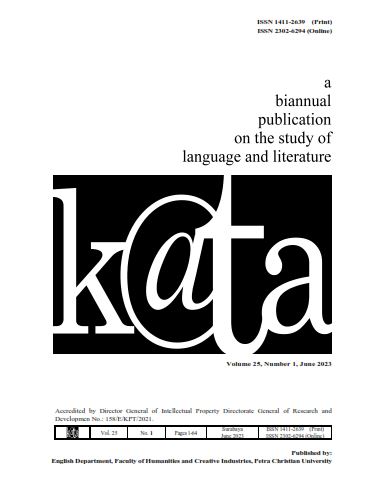Influence of (Non) Observance of Maxims on Evasion in Malaysian Parliamentary Question Time
Abstract
This content-analytic study examines the influence of (non) observance of maxims in the production of evasive responses in Malaysian Parliamentary Question Time. The analysis was based on the theories of Cooperative Principle (Grice, 1975) and Clayman’s Framework of Resistance (2001; 2012). Two strategies of (non) observance of maxims were found to produce evasive responses namely, violating and opting out. Ministers and deputy ministers were found to frequently shift tasks required by providing assurances to the questioners and audience. They also acknowledged the issues raised without addressing them. Further, they talked about prior actions taken to address current issues and made a reference to another party to relieve themselves from bearing the responsibility alone which led to the violation of maxims that subsequently produced evasive responses. Evasive responses also occurred when ministers and deputy ministers disregarded the questions altogether, thus opting out of the Cooperative Principle. Despite being evasive, equivocal responses were deemed cooperative as no instances of follow-up questions were recorded.
Downloads
References
Al-Zubeiry, H. Y. A. (2020). Violation of Grice’s maxims and humorous implicatures in the Arabic comedy Madraset Al-Mushaghbeen. Journal of Language and Linguistic Studies, 16(2), 1043-1057.
Antaki, C., & Stokoe, E. (2017). When police treat straightforward answers as uncooperative. Journal of Pragmatics, 117, 1-15.
Attardo, S. (1997). Locutionary and perlocutionary cooperation: The perlocutionary cooperative principle. Journal of Pragmatics27(6). 753–779.
Bull, P., & Simon-Vandenbergen, A. M. (2014). Equivocation and doublespeak in far right-wing discourse: an analysis of Nick Griffin's performance on BBC's Question Time. Text & Talk, 34(1), 1-22.
Bull, P., & Strawson, W. (2020). Can’t answer? Won’t answer? An analysis of equivocal responses by Theresa May in Prime Minister’s Questions. Parliamentary Affairs, 73(2), 429-449.
Ceballos, C. T., & Sosas, R. V. (2018). On court proceedings: A forensic linguistic analysis on maxim violation. Journal of Nusantara Studies (JONUS), 3(2), 17-31.
Chovanec, J. (2020). “Those are not my wordsâ€: Evasion and metalingual accountability in political scandal talk. Journal of Pragmatics, 158, 66-79.
Clayman, S. E. (2001). Answers and evasions. Language in Society, 30(3), 403-442.
Clayman, S. E. (2012). Conversation analysis in the news interview context. In J. Sidnell & T. Stivers (Eds.), The handbook of conversation analysis (pp. 630-656). Malden, MA: WileyBlackwell.
Clementson, D. E. (2016). Why do we think politicians are so evasive? Insight from theories of equivocation and deception, with a content analysis of US presidential debates, 1996-2012. Journal of Language and Social Psychology, 35(3), 247-267.
Cutting, J. (2005). Pragmatics and discourse: A resource book for students. Routledge. London: Taylor & Francis.
Davies, B. L. (2007). Grice's cooperative principle: meaning and rationality. Journal of Pragmatics, 39(12), 2308-2331.
Ephratt, M. (2012). “We try harderâ€â€“Silence and Grice’s cooperative principle, maxims and implicatures. Language & Communication, 32(1), 62-79.
Galasinski, D. (2000). The language of deception: A discourse analytical study. London: Sage Publications.
Grice, H.P. (1975). ‘Logic and conversation’. In P. Cole and J. J. Morgan, eds. Syntax and semantics, volume 3: speech acts (pp.26-27). New York: Academic Press.
Grice, H. P. (1989). Studies in the way of words. Cambridge, MA: Harvard University Press
Hanafe, N. Z., (2016). Evasion strategies by politicians in news interviews/Nur Zahraa Hanafe (Unpublished Master’s thesis). University of Malaya, Kuala Lumpur Retrieved on Dec 20, 2019 from. http://studentsrepo. Um.edu.my /6812/1/ Full_thesis.pdf
Insch, G. S., Moore, J. E., & Murphy, L. D. (1997). Content analysis in leadership research: Examples, procedures, and suggestions for future use. The Leadership Quarterly, 8(1), 1-25.
Khalisah, A., & Anjarningsih, H. Y. (2020). “Taking it for grantedâ€: The utilization of pragmatic aspects in entertainment news reporting on Instagram. Indonesian Journal of Applied Linguistics, 9(3), 508-516.
Krippendorff, K. (2004). Content Analysis: An Introduction To Its Methodology (2nd ed.). Thousand Oaks, California: Sage.
Kurzon, D. (1995). The right of silence: A socio-pragmatic model of interpretation. Journal of pragmatics, 23(1), 55-69.
Levinson, S. C. (1983). Pragmatics. Cambridge: Cambridge University Press.
Lindblom, K. (2001). Cooperating with Grice: A cross-disciplinary metaperspective on uses of Grice's cooperative principle. Journal of Pragmatics, 33(10), 1601-1623.
Mooney, A. (2004). Co-operation, violations and making sense. Journal of Pragmatics, 36(5), 899-920.
Nemesi, A. L. (2015). Levels and types of breaking the maxims: A neo-Gricean account of humor. Intercultural Pragmatics, 12(2), 249-276.
Reich, W. (2011). The cooperative nature of communicative acts. Journal of Pragmatics, 43(5), 1349-1365.
Penyata Rasmi Dewan Rakyat, [Online], Available from:
Yaqin, L. N., & Shanmuganathan, T. (2018). The Non-Observance of Grice’s Maxims in Sasak. 3L: Language, Linguistics, Literature®, 24(2), 166-180.
Thomas, J. (1995). Meaning in interaction: An introduction to pragmatics. Harlow: Pearson Education.
Yamalita, B., Jayantini, I. G. A. S. R., & Sulatra, I. K. (2021). VERBAL HUMOR CREATED BY NON-OBSERVANCE OF COOPERATIVE PRINCIPLE IN MIRANDA. Language Literacy: Journal of Linguistics, Literature, and Language Teaching, 5(1), 80-89.

This work is licensed under a Creative Commons Attribution 4.0 International License.
![]() This work is licensed under a Creative Commons Attribution License
This work is licensed under a Creative Commons Attribution License




.png)
.png)

.png)












